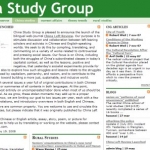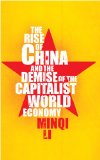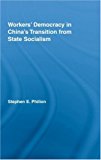Articles in the CSG Articles Category
CSG Articles »
Is socialist revolution necessary? Under what conditions? How far should it go? Is more than one revolution needed, even in the same society? What about the issue of revolutionary “excess”? Is there such a problem, and if so, what causes it and does it lead to counterrevolution? If the revolution is “defeated,’ was it still worth undertaking? And finally, who gets to decide these questions, and write the history of revolutionary change? For each country or society, these queries must be broken down more specifically. In the case of China, …
CSG Articles »
The protests in Lhasa and other Tibetan areas last week were
organized to embarrass the Chinese government ahead of the Olympics.
The Tibetan Youth Congress (TYC), the major Tibetan exile organization
that advocates independence for Tibet and has endorsed the use of
violent methods to achieve it, has said as much. Its head, Tsewang
Rigzin, stated in a March 15 interview with the Chicago Tribune that
since it is likely that Chinese authorities would suppress protests in
Tibet, “With the spotlight on them with the Olympics, we want to test
them. We want them to show their …
CSG Articles »
Since ancient times, there are those who have dreamed of finding a City of Youth, where the population never ages, and any outsider who comes to live will remain forever young. They probably did not have in mind, however, the kind of “agelessness†found in Shenzhen, China. Lying just over the border from Hong Kong, this “instant city†grew in just over 25 years from a small fishing village to a sprawling metropolitan region now approaching 10 million people. As the first of the Special Economic Zones in China, it …
CSG Articles »
Every class and sub-class stratum in China is undergoing dramatic changes that will have a profound impact on their own role, the relations between them, and the future course of the society. These transformations are especially evident among the Chinese working classes, who are experiencing the most radical alterations in their conditions in many decades. They have major implications not only within China, but for the global system, both in their own direct impact and as one “model†for developments elsewhere as well. The Chinese working classes are today mounting …
CSG Articles »
I take it that this occasion on the 40th anniversary of the Cultural Revolution is not a commemoration-which would distance it too far into the past to have any relevance to the present, or a celebration-which would bring it too close to the present as if it might be directly relevant, but an opportunity to reflect on an event of great historical significance, which raised questions which may be as relevant as ever, and perhaps more so than they ever have been. I would like to take this opportunity to …
CSG Articles »
今年是文化大革命发动40周年,仇视和歌颂文化大革命的双方都在纪念。文革结束以来,似乎一切以经济建设为中心了,似乎大家都不谈文革了。但是,文革仍然是中国各级政治舞台上各色人物的最刻骨铭心的经历,仍然是政治事件和决策背后最深层的动因
CSG Articles »
On May 27, 1871, what Marx called the “final mass murder” of the supporters of the Paris Commune was carried out at a wall of the Pere Lachaise cemetery there. A plaque still marks the place of their martyrdom, now almost a century and a half old. With their deaths, the first revolutionary proletarian exercise of governmental power in the world came to an end. It had lasted only 72 days. Though the socialist side of the Commune was limited by both the composition of the …
CSG Articles »
This essay was prepared for the June 9-10, 2006 Hong Kong Conference: “The Fortieth Anniversary: Rethinking the Genealogy and Legacy of the Cultural Revolution” sponsored by the China Study Group, Monthly Review, and the Contemporary China Research Center of City University of Hong Kong. It was translated from the French by Shane Mage.
CSG Articles »
Introduction
The Great Proletarian Cultural Revolution (GPCR) in China from 1966-69 came at a time when the patriotic and democratic mass movement in the Philippines had stirred back to life and was gaining new-found vitality. This resurgent mass movement was in the form of a national democratic revolution that drew inspiration from the victorious Chinese new democratic revolution .
Like pre-1949 China, post-war Philippine society was semi-feudal and semi-colonial. The big compradors and big landlord classes dominated the backward, agrarian, pre-industrial economy. The Philippines was granted nominal independence …





